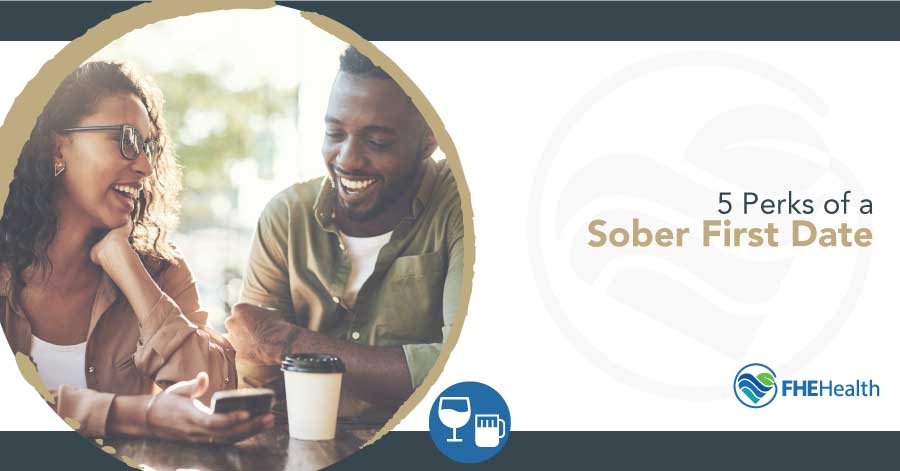
In 2018, we published a blog about the challenges of dating and searching for a new partner while in recovery. Since then, we’ve noticed a trend that appears to be growing among the millennial generation in particular. In a culture where so many things are defined by their relationship with the consumption of alcohol, more and more people in their 20s and 30s are making an effort to explore the experience of sobriety.
This newfound commitment to living life without alcohol is a positive development when so many people live a lifelong battle with alcoholism and recovery in such an alcohol-centric society. This trend means that the stigma is being removed from sober activities as a whole. This got us interested in people’s experiences drinking on dates. It’s an extremely common practice, but popular culture only represents the positives. What we’ve found is that this isn’t always the true picture of mixing drinks and dating.
Potential Consequences of Drinking on Dates
What if you drink too much? Many people actually drink more when they’re nervous, which can quickly lead to a situation in which they find themselves more intoxicated than they feel is safe or responsible. This can result in a situation where they’re making decisions they wouldn’t be making when they’re sober — taking risks that can put their wellness in jeopardy.
Of course, not all situations are like this, but there are several reasons why it can be significantly more enjoyable to be sober on a date — especially a first date. Here are the top five perks to a sober first date, courtesy of FHE Health.
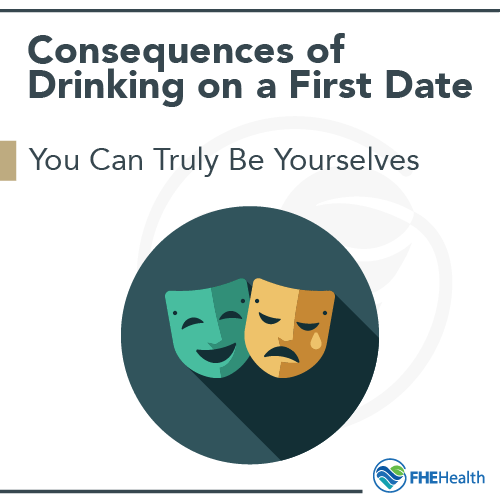 1. You Can Truly Be Yourselves
1. You Can Truly Be Yourselves
Drinking can be a way to cope with a variety of emotions: trauma, grief, stress, and other negative behaviors. With this in mind, alcohol isn’t always used as a route to escape from the bad things in our lives. It can also be a way to ease social discomfort in an awkward situation. This is one of the reasons why dating and drinking go hand-in-hand so often.
But there’s also a downside. Alcohol actually changes the way the brain functions, lowering barriers to impulsiveness and decreasing inhibitions. Simply put, it temporarily changes your behavior. For many, this is why they use it on dates, but the point is that the person you are when you’re drinking just isn’t you.
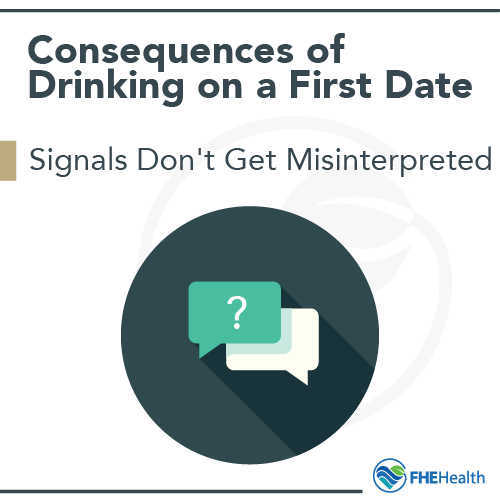 2. Signals Don’t Get Misinterpreted
2. Signals Don’t Get Misinterpreted
Drinking also lowers your ability to perceive the reality of a situation. This can lead to awkwardness, especially on a first date, where uncomfortable situations are more common. The fact is that dating is complicated. Trying to feel out whether you’re compatible with a person you just met, how you can make things go more positively, whether or not they’re interested in continuing the night at another location or if they even want to see you again at all is much more difficult when you’re not sober.
There’s so much ambiguity and potential for misread signals that happen, especially when you’re drinking on dates. Wouldn’t you rather navigate these tricky situations with as clear a mind as possible?
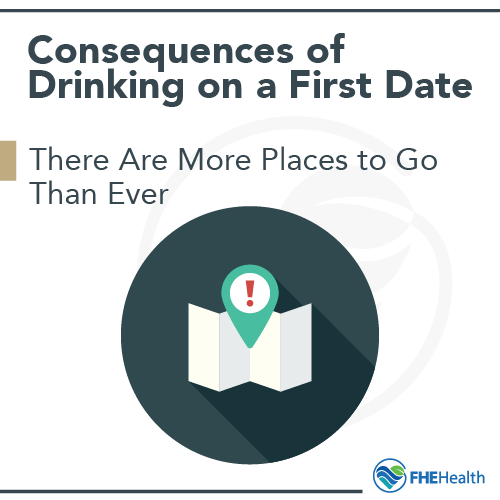 3. There Are More Places to Go Than Ever
3. There Are More Places to Go Than Ever
One phenomenon that has largely correlated with an increase in people wanting to go out and be sober is a new place to hang out: sober bars. These are establishments that look and feel identical to your typical bar setting with one key difference: alcohol isn’t on the menu. Some people in recovery come to these bars as a place to experience positive memories of their old lives without the triggers that come with the conventional nightlife scene, but these places are also becoming more and more popular with people who simply don’t want to drink or don’t enjoy how it makes them feel.
Even if there isn’t a sober bar in your area, there are plenty of options for first dates that don’t involve drinking. Going to a movie where alcohol isn’t served, a traditionally sober activity like playing mini golf, or going on a hike in a park nearby are just a few examples.
People in recovery who start dating are warned to stay away from dinners when they first start out, but that doesn’t rule out all meals. Going on a breakfast date can be a great way to flip the narrative, and it doesn’t come with accompanying pressure to imbibe.
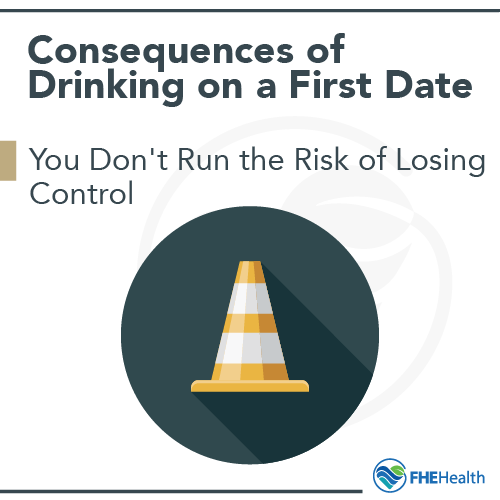 4. You Don’t Run the Risk of Losing Control
4. You Don’t Run the Risk of Losing Control
Having too much to drink in most social situations is a real concern, and when you’re using alcohol heavily on a first date, you’re taking a risk. A first date is unique in that you’re out with a person you know very little about. Even in the era where a person’s identity can be explored at the click of a button, “stranger danger” still applies to a degree.
When you’re drinking, you begin to lose the instincts that control your decision-making. You become impulsive and have the tendency to act recklessly. The outcome of this is that you may put yourself in danger. One of the benefits of a sober date is that you maintain the ability to keep your wits about you until you’re relatively sure you can trust the person sitting across from you.
There’s also a health risk associated with drinking in these situations. Even on a first date, drinking has been linked with unprotected sex. While there’s nothing wrong with being physical on a first date if that’s what you feel is the right choice for you, your ability to consent is hampered by the effects of the alcohol, and you may make a decision you’ll come to regret.
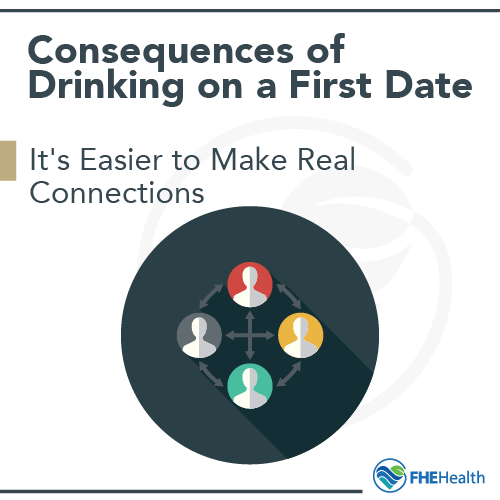 5. It’s Easier to Make Real Connections
5. It’s Easier to Make Real Connections
Some people even drink before a date, a practice commonly known as pregaming. Experts say this practice is so common because alcohol acts as a crutch. People worry about seeming comfortable or natural before a date, so they drink to cover up these anxieties. The end result, though, is that the date becomes a facade — if one or both parties are hiding who they are behind alcohol, it’s harder to make a real connection.
When you don’t have to worry about the many downsides of drinking, you can focus on the connection you make with the person across from you. Part of the reason for this is honesty, which may seem counterintuitive. After all, alcohol is known to make people lose the ability to filter the things they say.
But this type of honesty is different. When you feel a real connection with a person you just met, you’re more likely to be vulnerable with them. When you’re not sober, you may not be able to trust this feeling. When you are, it will be clear.
Getting Sober and Dating
Removing drinking from so many parts of our culture is important to those who are dealing with the real struggles of navigating sobriety, especially younger people for whom “normal behavior” almost inherently includes the consumption of alcohol. Anyone who has ever struggled with addiction can tell you there are unique challenges when getting over any type of addiction, but because of the way alcohol is almost revered in American society, the challenges, in this case, are especially visible.
Alcohol Treatment at FHE Health
For people struggling with alcoholism, normalized drinking has made it more difficult to understand when it’s time to get help. If you even suspect that you or a loved one have an issue with drinking, give us a call to learn about all your options.






